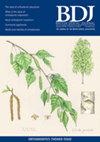Endodontic education - present status and future directions
IF 2
4区 医学
Q2 DENTISTRY, ORAL SURGERY & MEDICINE
引用次数: 0
Abstract
This paper explores the current landscape and future direction of endodontic education, highlighting the crucial role of individual self-efficacy in both teachers and learners. Endodontic education is influenced by a wide range of factors and frameworks that enable students to develop the scientific knowledge and procedural skills that support evidence-based practice. Educators in endodontics require appropriate training to support students through pre-clinical training and into clinical practice. This paper discusses innovative educational strategies, such as the use of additively manufactured typodonts for realistic practice and complexity progression, as well as the integration of augmented and virtual reality (AR/VR) to enhance experiential learning. Additionally, we discuss the implications of artificial intelligence (AI) in personalising learning experiences and improving diagnostic skills. Through these discussions, we identify promising directions for future research and pedagogical innovation in endodontics.

牙髓病教育--现状和未来方向
本文章由计算机程序翻译,如有差异,请以英文原文为准。
求助全文
约1分钟内获得全文
求助全文
来源期刊

British Dental Journal
医学-牙科与口腔外科
CiteScore
3.10
自引率
15.40%
发文量
1096
审稿时长
4-8 weeks
期刊介绍:
The role of the BDJ is to inform its readers of ideas, opinions, developments and key issues in dentistry - clinical, practical and scientific - stimulating interest, debate and discussion amongst dentists of all disciplines. All papers published in the BDJ are subject to rigorous peer review.
 求助内容:
求助内容: 应助结果提醒方式:
应助结果提醒方式:


